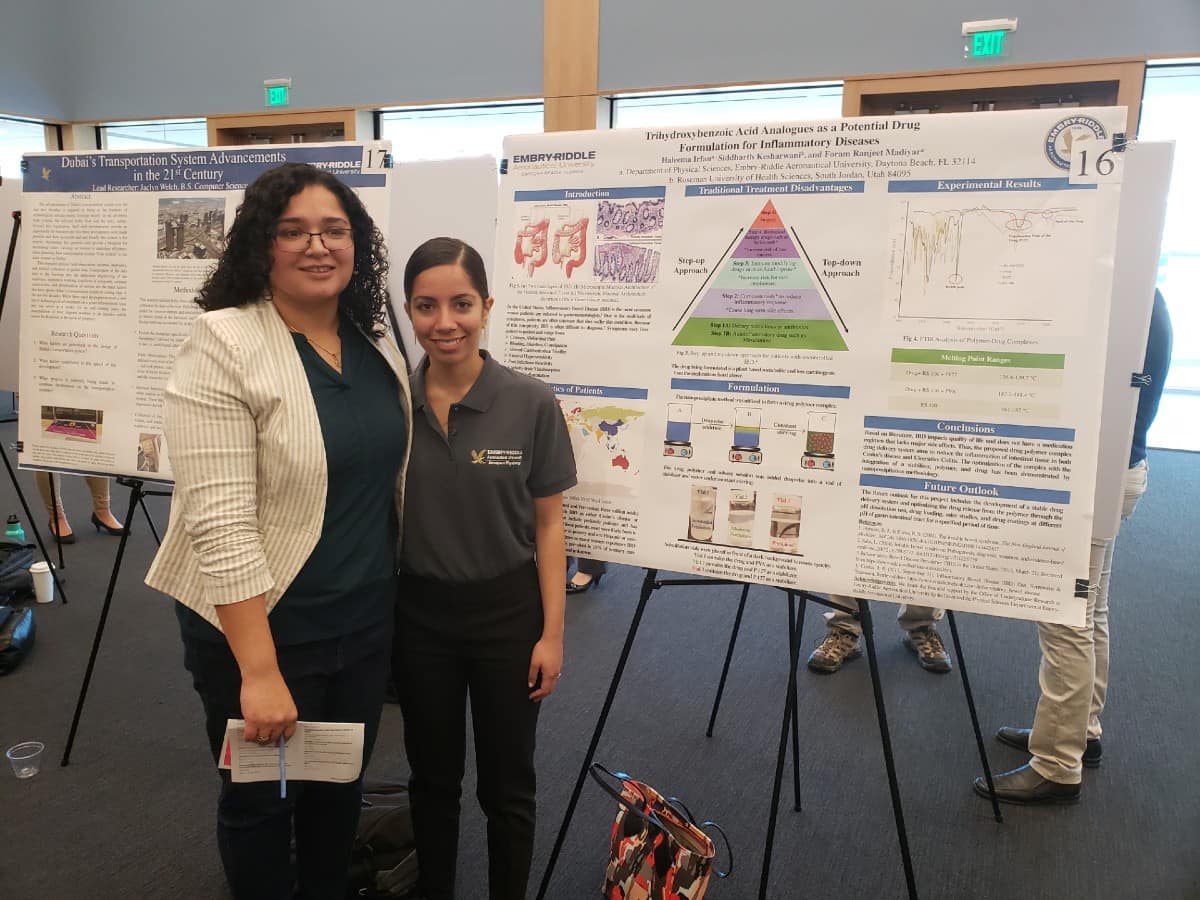Undergraduate Research Earns Funding for Astronaut Safety Equipment, Innovative Sports Injury Prevention, More

Research by Embry-Riddle senior Haleema Irfan will help create a sensor for detection of a serious problem encountered by astronauts on long-term spaceflights: hydrocephalus, or an accumulation of fluid in the brain.
“Studying hydrocephalus and its involvement in gravitational stress will allow scientists to better understand cerebral spinal fluid disorders,” said Irfan, who is majoring in Aersospace Physiology and Human Factors Psychology. “However, before exploring this condition, a rapid detection method should be created.”
As space explorers contemplate longer trips in space, such as manned missions to Mars, hydrocephalus associated with long-term spaceflight (HALS) poses a significant challenge. Provoked by shifts in the cephalic fluid that occur in a microgravity environment, the condition can cause symptoms including impaired functioning.
Irfan’s proposed sensor would work by detecting certain metabolites that are present specifically with hydrocephalus, whether associated with spaceflight or in patients with, for example, brain injuries that have provoked the accumulation of fluid.
Irfan’s research is being funded by a Student Internal Grant for the 2020-’21 academic year from the Embry-Riddle Office of Undergraduate Research.
Many other grants, totaling $85,000, were also awarded. One — an assessment of techniques to minimize anterior cruciate ligament injuries in female soccer players — is being conducted by Mechanical Engineering senior Aspen Taylor, through the Ignite Grant program. Another, through the Student Internal Grant program, will fund the development of a composite material made of silicone rubber and phase change material, which has a unique capability to keep temperatures within a desired range, and is led by Madison Lilly, a senior in Mechanical Engineering.
A continuation of a 2019 Ignite grant to study the total solar eclipse in Chile in December 2020 and its effect on satellite communications was awarded to Daniel Koshy, a sophomore in Aerospace Engineering. Last year's grant recipients, Lucas Tijerina and Daniel Nigro, presented their work in a poster at the 2019 fall meeting of the American Geophysical Union and won the Outstanding Student Research Award.
Student Internal Grants, which are awarded up to $7,500, fund long-term research for undergraduate and master’s degree students. Ignite Grants, which reach as high as $10,000, are designed for undergraduate-led groups, also to finance long-term research. Both types of grants are generally awarded at $5,000 or less.
Wesley Lewis, director of the Office of Undergraduate Research, said the 21 grants awarded represent an excellent effort by Embry-Riddle students.
“The grant review committees were impressed by the scope and caliber of this year’s research proposals,” Lewis said. “Students showed their passion for the research enterprise and for solving unique challenges facing our society.”
Because of the Covid-19 pandemic, the reviewers requested students present their proposals via Zoom, “which students adapted to in order to articulate their research goals during these challenging times,” Lewis said.
“I look forward to a great year of research and scholarly activity from these research projects,” he said.
Another project funded by an Ignite Grant involves the study of inflammation, particularly of the mouth, that often occurs with radiation treatment administered to cancer patients. Aerospace Physiology junior Amelia Hartnett is exploring the biological processes behind the condition, known as oral mucositis, and a potential remedy. Finding ways to mitigate and treat mucositis also has ramifications for travel in space, where radiation levels are higher than on the Earth’s surface. Irfan, the HALS researcher, is Hartnett’s peer mentor on the study.
The grant, Hartnett said, has made her research possible.
“The grant plays a vital role, because it enables us to have a location to perform the project [the Nanomaterials Laboratory in the Embry-Riddle College of Arts and Sciences], to purchase all the equipment, and it also gives us the opportunity to share our findings at several different conferences,” she said.
 Michaela Jarvis
Michaela Jarvis